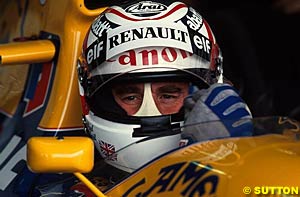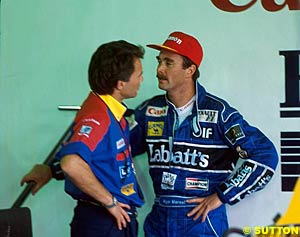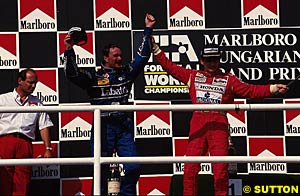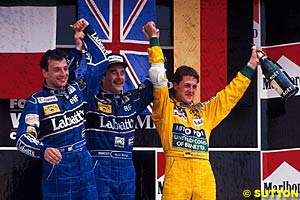
Part I: The Champion
Atlas F1 Contributing Writer
Nine Grand Prix victories, 14 pole positions, 8 fastest laps, 698 race laps led, 108 Championship points. That was the unequivocal domination that Nigel Mansell and Williams had on the 1992 Formula One World Championship. If you only started watching Formula One recently, you could be excused in thinking that Michael Schumacher and Ferrari's domination this season is one of a kind. In some ways, it echoes the remarkable story of 1992. In many ways, however, it couldn't be more different. In a special project, exclusive for Atlas F1, journalist Georgie Shaw, author Derick Allsop, World Champion Nigel Mansell and Williams Technical Director Patrick Head unfold the story of 1992 - the battles on track, the remarkable technological advantage, the acrimony behind the scenes and the aftermath of that season.
"And to be there with Ayrton Senna - the greatest competitor that Formula One has ever seen - was very special. Ayrton put his arm around me and said some very moving words that I will always remember. It was a very personal exchange between us; two drivers at one with each other. It was a fantastic moment; very, very special."
Turning his thoughts back to the Championship he says: "There's no question about it. It is the most fantastic feeling any driver can have to reach the pinnacle of their racing career by winning that particular Championship. I had been with Williams a long time as a Number 2 but not as a Number 1 and everybody thought that I had probably done my homework and paid my dues. That's when everyone pulls for you.
"It was a very great year up until I won the World Championship, then I found that I had lost my driving seat! That was the worst moment and I still don't understand why to this day. It's not something that I like to think about, even now. However, I can take some solace in the fact that other drivers have suffered a similar fate. Although it's not a pleasant one, those things do happen."
Drama stalked Nigel Mansell's entire career and only the offer of the Williams Number 1 seat for the 1991 and 1992 seasons reversed his decision to quit the sport in 1990. It was the opportunity that he had been waiting for throughout his motor racing life; to have all the right ingredients at his disposal to mount a serious challenge for the World Championship. Adrian Newey, a talented aerodynamicist, joined the Williams team in early 1990, and together with Patrick Head produced a package that would undoubtedly give Mansell his best opportunity.
For several years Williams had been working on a highly sophisticated computer-programmed suspension system called active-ride, which endeavoured to optimise aerodynamics at all speeds. Mansell and teammate Riccardo Patrese first tried out the system back in '88, but it wasn't until the end of 1991 that the team decided to use it full-time in 1992.
"It was a major decision to use the active-ride car," Mansell recalls today. "There was no question it was something special, as long as we could fully understand it and make it reliable. Once we had decided on that route it became vital to put all our efforts behind the programme to maximise that opportunity. If we had 'hedged our bets' and tried to split the programmes (running an active and passive car) we could not have exploited the full potential of either programme without a tremendous amount of resources, workforce and money. Perhaps in those circumstances it could be fully exploited. However at that particular time we had to choose one route. Fortunately, we chose the right route."
"You had to set yourself up in a corner in a certain way, to keep the throttle flat-out just a little bit longer, then it would give you a little more grip. But it was a constant battle to override the alarm bells ringing in your head warning you not to go any quicker or you will hit the barriers! So you had to really push the limits a lot and, at times, unless you got that feeling (total confidence) you weren't able to do that."
Q: How did you override those alarm bells?
"When you want something badly enough, something that you have worked for your whole life - to become World Champion - you find an inner strength."
Derick Allsop, The Independent's F1 Correspondent, who was writing a book on Mansell's bid for the Championship back then, recalls today: "Riccardo Patrese - who was a very good driver and the most experienced driver in the history of Formula One at that time - said that he just could not live with Nigel. Obviously the characteristics of the car suited Nigel's driving style and a lot of people said that it didn't suit Riccardo. I'm sure there is truth in that, but having found himself in that situation, Nigel really did take it to its maximum.
"It was almost as though he had waited all his career for that year, for that opportunity. He was close in '86 and '87 as we know, and that kind of fed the frustration and fed the determination. When he got that chance again, he took it with both hands. It was obviously the best car in the field, he could almost sense that towards the end of '91. I spent a lot of time with him during the winter of '91/'92 working on the book. I sensed a new intensity about him, he trained hard over the winter and he was quietly but palpably confident that this would be a good car. Although I'm not sure that he was certain it was going to be that good. Certainly he didn't want to do anything that would distract him from his programme which might have hindered his chances."
His chances nearly ended in Adelaide at the end of the '91 season. Crashing out of the storm-ridden Australian Grand Prix, he broke two bones in his left foot during the chaos and mayhem which saw several drivers crash heavily into barriers or into each other. Yet Mansell decided to keep the injury a secret, rather than undergo an operation.
"The recovery time would have been too long following any operation to remove the broken bones in my foot," he explains. "That would have jeopardised my chances for the following season, so I didn't want anyone to know about the injury. I knew that an opportunity like this only comes once and I was determined it wasn't going to slip away. I think everybody has an opportunity in life, it's whether they take it with both hands and grasp it and make it work for them. That's exactly what I did in '92, the opportunity was there and I took it."
"Nigel's career has always been a sort of a calculated risk," Allsop explains. "He got into Formula One on the strength of a test with Lotus at Peter Collins' suggestion. He wasn't really fit because he had just had a big accident and crushed two vertebrae in his neck .As we know, Nigel has had all sorts of shunts in his career; he's broken his neck, he's broken his back, in '86 he had the trauma of the burst tyre, in '87 he had another big shunt (practice at Suzuka). I think all this contributed to the climax that was '92 and made it all the more satisfying for him.
"There's no question that Nigel felt he had to prove something to a sceptical watching audience. Even though I was quite close to him, I remember in '86 when I did my season's preview and said Piquet was favourite for the title, Nigel came up to me and said: 'I know what you wrote, and I'll show you!' And, he damn well nearly did. In fact, morally he probably won the Championship that year (in 1986).
"So all this contributed to the climax that was '92 - it was almost a redemption, a fulfilment. But it was more: it sounds a bit over the top, but it was almost a spiritual fulfilment as well. If you go back further, you know the story about mortgaging his house and all that sort of stuff and Rosanne's [Mansell's wife] loyalty, all that kind of thing. Everything about Nigel was drama and all built up to this wonderful, wonderful year of '92. If anything was going to happen to any driver it would happen to Nigel.
"The public took to Nigel because he was one of the people, they could see in him a little bit of themselves, a little bit of the guy next door, fighting the system, fighting the odds, overcoming all the stress and drama and catastrophes. And when he went for a lap he went for it big time.
"He was exciting, that's what got people, he was exciting to watch, he was unpredictable, but that was part of the drama. There was Prost who was predictable; a wonderful, wonderful driver but he didn't stir the emotions as Nigel did. Nigel, if nothing else, stirred the emotions. One way or another - whether you loved him or hated him - he had an effect on you, you couldn't ignore him. And, if you're honest you would have to admit that he was exciting to watch, the sheer spectacle of watching him was great entertainment and this after all is entertainment.
"People spend a lot of money to see guys 'going for it', they want to see excitement and Mansell provided that. Montoya might be the closest to him now. Clearly Michael is a cut above the rest and may well be the greatest driver of all time. Alesi had something of Nigel about him and now I see it in Montoya as well; he goes out there, gives it the gun, doesn't give a monkey's about reputations and Nigel was just the same. He just went out there and gave it all and people around you within a team will respond to that. If they see you putting your neck on the line they will respect you for it and be moved by you, be stirred by you and be lifted by you.
As for comparing the domination over a single season between himself and Williams in 1992, with that of Schumacher and Ferrari in 2002, Mansell suggests: "It's obviously a different set of circumstances but rather than draw a parallel between my Championship year and Michael Schumacher's this year, the one I would draw is of the number of Championships. Had I stayed with Williams in '92, with the knowledge and understanding of the cars and team gathered over several years, there's no question for me '93, '94, '95 or how many other years after that, we could have had the most fantastic honeymoon period of success. Unfortunately nationalities, finance and sponsors intervened and the French engine manufacturer wanted a French driver to be the next World Champion.
"I draw a parallel because Williams at that time could have been reasonably dominant with whichever driver and that was because of all the hard work that Riccardo and I had put in, obviously with the team. Just look at the situation that Michael Schumacher enjoys at Ferrari now - it is Utopia. He is undoubtedly one of the greatest drivers, but I reiterate - one of them, and he has the full support of the entire team and all the sponsors, which is great for him. But there has rarely been any other driver who has been in a similar position. Maybe Ayrton and Alain Prost enjoyed a similar situation for a certain period of time with McLaren. However it's wonderful to see that a team is being so loyal to a driver because in the past other teams could have been a lot more loyal to their drivers than they have been."
Allsop adds: "This car that Schumacher has now is not probably quite as good as Nigel's 1992 car, but we're seeing a similar situation where the guy is really driving it and getting the best out of it. The difference is that Mansell was doing it in qualifying as well, here we've seen Montoya take pole more often than Schumacher. Mansell dominated everything that season!"
Atlas F1 columnist and Williams press officer back in 1992, Ann Bradshaw, concurs: "It was a lot more competitive then, much closer, you just have to look at the line-up of World Champions he was competing against. We do have a 'them and us' situation in some of the pitlane now, but then it was a lot closer and a lot more competitive. I don't think it was quite the total domination that we are seeing now ('02) because he did have to fight a bit more but he was very competitive, he was always there (at the top).
"The thing is with Nigel, nothing was ever quite easy for him, he always did things the hard way. He had to do things the hard way - it was part of his nature and part of the folklore of Nigel, but he did a great job. He deserved that title, he had paid his dues.
"I don't think anybody would say that Nigel didn't deserve to win it and nobody minded that he won it that early (in the season) because he had done all the right things in the right job and so had the team. It was just great when he won the Championship."
In summing up, Mansell says: "It is only now that I am beginning to reflect on the Championship, because when you are continually moving forward in whatever direction in life it takes up your entire focus. So it is only now when people are saying how marvellous the early 90s were that I am beginning to reflect on what it means to me. It's like wine - as time passes it gets better!"
This is the story of the 1992 season, told by the men who were there, who made history without even realizing it at the time. Exactly 10 years ago this month, one Nigel Mansell, at the age of 39, wrapped up the World Championship at the 11th round of the year - with more races to go than anyone else before him. It was his first and only Formula One World Championship; it was his last full season in Formula One.
 The date was August 16th, 1992 - the Hungarian Grand Prix on the outskirts of Budapest. Mansell didn't win on that day - but his second place secured him the title. "I had an overwhelming feeling of elation, relief and satisfaction standing on the podium in Hungary after winning the Formula One title," Mansell recalls today, speaking from the United States exclusively to Atlas F1.
The date was August 16th, 1992 - the Hungarian Grand Prix on the outskirts of Budapest. Mansell didn't win on that day - but his second place secured him the title. "I had an overwhelming feeling of elation, relief and satisfaction standing on the podium in Hungary after winning the Formula One title," Mansell recalls today, speaking from the United States exclusively to Atlas F1.
 At first Mansell had grave misgivings about using the active-ride car because of his previous experience of it, first at Lotus in 1980 and then at Williams in 1988. Although the system offered huge potential, until late '91 it had proved unreliable and when it failed it gave the driver some hairy moments. Mansell explains: "My previous experience with active suspension helped me trust the system probably more than Riccardo did. It was really quite a ferocious system, and if you could trust it, you could go deeper into a corner than you ever thought possible.
At first Mansell had grave misgivings about using the active-ride car because of his previous experience of it, first at Lotus in 1980 and then at Williams in 1988. Although the system offered huge potential, until late '91 it had proved unreliable and when it failed it gave the driver some hairy moments. Mansell explains: "My previous experience with active suspension helped me trust the system probably more than Riccardo did. It was really quite a ferocious system, and if you could trust it, you could go deeper into a corner than you ever thought possible.
 Mansell realized, though, that his level of fitness would play a vital role in helping him to mask the injury. So he embarked on a rigorous training programme at his Florida home during the winter break. When Mansell turned up in South Africa for the first round of the Championship, he looked in prime condition and no one guessed that he was hiding an injury or that he had a specially moulded kevlar insert in his left shoe. That's the way he wanted it. He wanted everyone to know that he was up for it that year.
Mansell realized, though, that his level of fitness would play a vital role in helping him to mask the injury. So he embarked on a rigorous training programme at his Florida home during the winter break. When Mansell turned up in South Africa for the first round of the Championship, he looked in prime condition and no one guessed that he was hiding an injury or that he had a specially moulded kevlar insert in his left shoe. That's the way he wanted it. He wanted everyone to know that he was up for it that year.
 "I think Nigel reached that kind of zenith in '92 when it all came together. He was absolutely going for it but he knew he had the means with which to do it and that made him feel good. He felt this was his moment and boy he took it, but it was controlled aggression most of the time that year because he knew he had the equipment, he wasn't stupid - he did some stupid things, but that didn't make him stupid. He knew that he could really stamp his authority on that season, which he did."
"I think Nigel reached that kind of zenith in '92 when it all came together. He was absolutely going for it but he knew he had the means with which to do it and that made him feel good. He felt this was his moment and boy he took it, but it was controlled aggression most of the time that year because he knew he had the equipment, he wasn't stupid - he did some stupid things, but that didn't make him stupid. He knew that he could really stamp his authority on that season, which he did."
Please Contact Us for permission to republish this or any other material from Atlas F1.
|
Volume 8, Issue 32
Atlas F1 Exclusive
Absolute Domination, Part I: The Champion
Absolute Domination, Part II: The Races
Absolute Domination, Part III: Patrick Head
Atlas F1 Special
Ground Supremacy
Measuring the Quintuple Champs
Articles
View from the Paddock
Columns
Rear View Mirror
Elsewhere in Racing
The Weekly Grapevine
> Homepage |